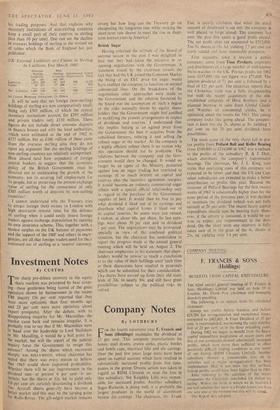Investment Notes
By CUSTOS
THE sharp pre-debate recovery in the equity share markets was prompted by bear cover- ing—these gentlemen being scared of the great optimism shown by businessmen in the recent FBI inquiry (56 per cent reported that they Were more optimistic than four months ago and 23 per cent were more optimistic about export prospects). After the debate, with its disappointing majority for Mr. Macmillan, the Market came back and remains irregular. It is Probably true to say that if Mr. Macmillan were to hand over the leadership to Lord Hailsham Or Mr. Maudling, it would be a bull point for the market, but will the report of the judicial inquiry force the Government to resign this autumn? Among the shares which recovered Sharply was ROLLS-ROYCE, whose chairman has Stated that there was every reason to believe that 1963 would show improved profitability. Whether there will be any improvement in the dividend rate—at present 6 per cent—is un- certain, but the shares at 32s. 6d. to yield only 3.6 per cent are certainly discounting a dividend rise. Aircraft shares generally have become a better market and this may be the turning point 1°r Rolls-Royce. The gilt-edged market remains
strong but how long can the Treasury go on cheapening the long-term rate while making the short-term rate dearer to meet the rise in short- term interest rates in America?
British Sugar
Having criticised the attitude of the Board of BRITISH SUGAR in the past I was delighted to find that they had taken the initiative in re- opening negotiations with the Government. A statement issued by the chairman reveals the fact that had the UK joined the Common Market the fixing of an EEC price for sugar would have enabled the company to function on normal commercial lines. On the breakdown of the negotiations other approaches were made to the Government and the solution favoured by the board was the assumptJon of 'such a degree of the risks normally borne by equity share- holders that the Government might feel justified in modifying the present arrangements in respect of dividends and reserves.' I understand that this implies buying at an agreed price from the Government the beet it acquires from the subsidised farmers, refining it and selling the refined sugar in the market As the company is a highly efficient refiner there is no reason why this operation should not be profitable. The relations between the company and the Gov- ernment Would then be changed. It would no longer be an agent of the Ministry protected against loss on sugar trading but restricted to earnings of so much interest on capital and reserves plus the incentive agreement margins. It would become- an ordinary commercial sugar refiner with a special official relationship only in regard to the purchase of the Government supplies of beet. It would then be free to pay what dividend it liked out of its earnings and distribute what capital bonus it liked out of its capital reserves. Its assets were last valued, 1 reckon, at about 60s. per share. Its last earn- ings were about 30 per cent and its dividend 7 per cent. The negotiations may be protracted, specially in view of the confused political situation, but the chairman has undertaken to report the progress made at the annual general meeting which will be held on August 2. The chairman emphasises in his statement that share- holders would be unwise to reach a conclusion as to the value of their holdings until such time as these discussions have resulted in proposals wNch can be submitted for their consideration.'
shares have moved up from their old static level of 24s. to nearly 30s. and still have great possibilities—subject to the political risks in- volved.


































 Previous page
Previous page